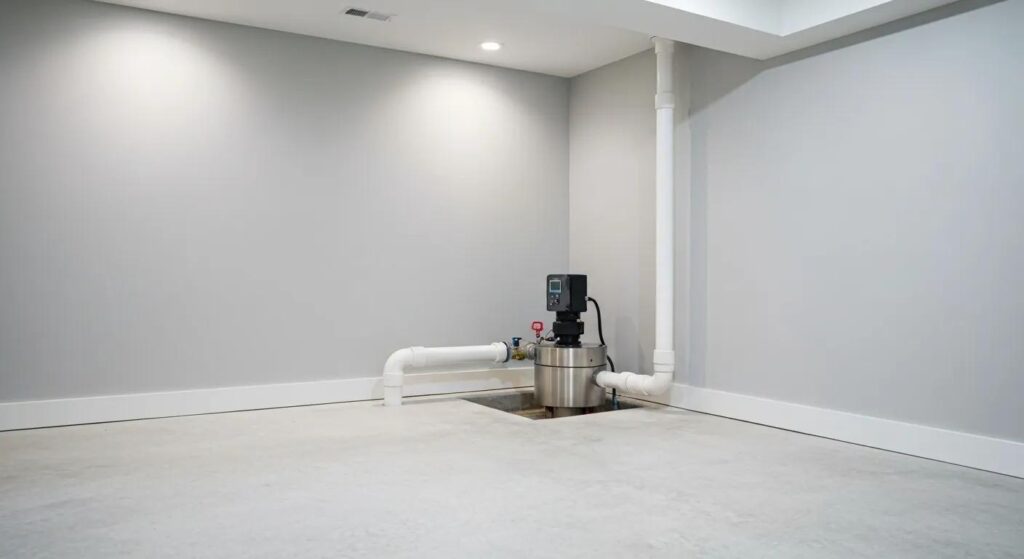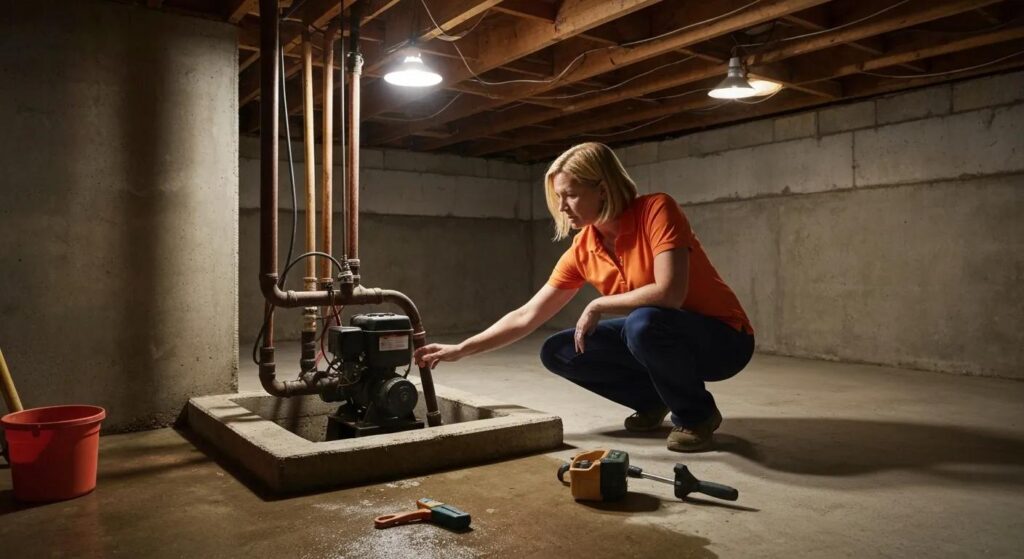
NJ Sump Pump Replacement: Reliable Solutions for a Dry Basement
Replacing a sump pump means removing an old or failing unit and installing a modern, correctly sized system so your basement can handle groundwater and storm runoff. In New Jersey—where coastal storms, heavy seasonal rain, and groundwater pressure are common—a dependable sump pump is one of the best defenses against basement flooding, mold, and foundation damage. This page walks you through how to spot a failing pump, the dangers of waiting, what a professional replacement looks like, and which pumps and backup options work best for NJ homes. You’ll also get homeowner checklists, a quick comparison of submersible vs. pedestal pumps, backup recommendations for power outages, and clear next steps to book a free inspection or estimate. We keep helpful terms like sump pump installation NJ, battery backup sump pump NJ, and sump pump inspection New Jersey throughout so you can find the right solution and know why timely replacement matters.
How Do You Know When It’s Time for Sump Pump Replacement in New Jersey?
Start with a basic check of how the pump behaves. Early warning signs—unusual noises, erratic cycling, or visible corrosion—mean the pump may not be reliable when you need it most. Catching these indicators before a storm reduces the chance of catastrophic basement flooding and keeps hydrostatic pressure around your foundation under control. Below are simple, practical signs you can look for during a quick inspection and why they often point to replacement rather than a quick fix. Use these checks to decide whether to schedule a professional inspection that confirms the right next step.
What Are the Common Signs of a Failing Sump Pump?

Many pumps give clear clues before they fail. Listen for grinding or rattling that can mean bearing or motor wear. Watch for continuous runs or frequent short cycles—these often indicate float-switch problems or a pump that’s undersized for the inflow. Inspect the unit for rust, corrosion, or oil leaks that compromise safety and performance. And if the pump doesn’t run during heavy rain, the float switch or wiring may be at fault. Spotting these issues helps you prioritize a full assessment so you avoid an emergency replacement after a flood.
How Long Does a Sump Pump Typically Last in NJ Homes?
There’s no single number for every home, but most residential sump pumps perform well for several years. Longevity depends on pump type, how often it runs, the volume of water it moves, and whether a backup is used. In New Jersey’s heavier-use conditions, expect a shorter service life than in drier areas—so plan replacements on a predictable schedule rather than waiting for total failure. Regular maintenance extends life, but if your home sees frequent storms or high groundwater, proactive replacement is usually the safer option. A professional inspection will help match timing to your actual pump wear and local conditions.
What Are the Risks of Delaying Sump Pump Replacement in NJ?
Putting off replacement raises the chance of basement flooding and accelerates damage to building materials, often resulting in repair bills that exceed the cost of a timely replacement. Running a marginal pump can lead to several problems: water entry that ruins finishes and stored items, mold growth that affects indoor air quality, and increased risk of foundation or structural damage from prolonged hydrostatic pressure.
- Basement flooding that causes immediate property damage and costly cleanup.
- Mold growth that creates health concerns and expensive remediation.
- Foundation and structural problems that can require major repairs over time.
These problems compound: water damage promotes mold, mold and moisture weaken materials, and structural issues raise long-term restoration costs. Understanding this chain of events helps homeowners decide between a temporary repair and a full replacement.
How Can a Failing Sump Pump Cause Basement Flooding and Water Damage?
Pumps fail in a few predictable ways: motors burn out, float switches stick or wear out, discharge lines clog, or check valves fail and let water flow back into the pit. When failure coincides with a storm or a power outage—which is common in New Jersey—inflow can quickly overwhelm the system and allow water into living spaces. Identifying the specific failure mode guides whether parts can be repaired or whether a full replacement is needed to restore reliable drainage.
What Are the Health and Structural Risks from Mold and Foundation Issues?
Persistent moisture from intermittent pumping or hidden leaks creates the perfect environment for mold, which can worsen respiratory symptoms and lower indoor air quality. On the structural side, recurring hydrostatic pressure and moisture cycles degrade concrete, mortar, and framing—leading to spalling, cracking, and soil shifts around the foundation. Those structural repairs often cost more than installing a higher-quality pump and proper backups. Acting quickly on pump issues protects both your home’s health and its long-term value.
What Is the Professional Process for Sump Pump Replacement in New Jersey?
A professional replacement follows a clear, step-by-step process: start with a thorough inspection and assessment, provide a straightforward recommendation and installation plan, then finish with commissioning, testing, and warranty documentation. The service checks pit condition, float mechanisms, discharge routing, and backup options, then matches a pump and setup to your home’s inflow and risk profile. A methodical approach reduces surprises on install day and delivers a tested system you can trust. The inspection is the key step that produces a no-obligation estimate and a recommended scope of work.
How Does a Free Inspection and System Assessment Work?
During a free inspection we evaluate the sump basin, pump operation, float switch function, discharge line condition, and whether you have a backup system. Technicians check electrical connections, measure cycling frequency, look for pit corrosion, and run discharge tests to find bottlenecks or worn parts that call for replacement. You’ll get a written report with photos, clear findings, and recommended replacement options so you can compare choices. That inspection becomes the basis for an accurate installation plan and helps prioritize needed backups or routing fixes.
| Inspection Component | What is Assessed | Typical Example Outcome |
|---|---|---|
| Sump Pit Condition | Basin integrity, corrosion, debris | Pit replacement recommended if severely corroded |
| Float Switch & Controls | Activation range, wiring, switch type | Replace malfunctioning float or upgrade to tethered switch |
| Discharge Routing | Pipe size, check valve, outlet condition | Reroute or replace clogged/undersized discharge piping |
This table highlights the inspection items that shape a recommended replacement plan. A focused inspection gives you concrete next steps and a reliable cost estimate.
What Are the Key Steps in Expert Sump Pump Installation and Testing?
A professional installation generally follows this sequence: remove the old unit, clean or repair the pit as needed, set and secure the new pump with the correct check valve, route discharge to a code-compliant exit, and integrate electrical and backup systems before running dynamic tests. Installers confirm pump capacity against expected gallons-per-minute, check float activation points, and cycle the pump multiple times to verify performance under load. You’ll receive documentation of the work and warranty details so there’s a clear record of the installation and service commitment. Thorough testing cuts the risk of early failure and prepares the system for New Jersey’s storm seasons. Read more about protecting your home from flooding.
- Removal & Pit Prep: Remove existing pump and assess pit for repair or cleaning.
- Pump Selection & Installation: Install the correct capacity pump and secure check valve/discharge.
- Testing & Documentation: Run static and dynamic tests; provide warranty and operation notes.
Following these steps creates a predictable installation path and ensures you receive a system that’s tested and ready for routine upkeep.
Why Choose Effective Basement Solutions for Your Sump Pump Replacement in NJ?
Effective Basement Solutions focuses on basement waterproofing and sump systems across New Jersey, helping homeowners get reliable protection when they need a replacement. We use licensed, in-house crews (no subcontractors), offer free inspections, back installations with warranties, and provide emergency support tuned to local storm and flood patterns. If you want a clear, no-pressure assessment from a local team, our combination of expertise and responsive service protects homes and preserves value. Below are the practical benefits our approach delivers.
- Licensed, in-house crews for consistent workmanship and clear accountability.
- Free inspections so you understand the problem before getting an estimate.
- Emergency response and backup expertise to handle urgent failures during storms.
These points mean you get both an accurate technical evaluation and a practical protection plan—not a one-size-fits-all replacement. To schedule a free inspection or learn more, call Effective Basement Solutions at +18009570075 or visit our Clark, New Jersey office for local service inquiries.
What Makes Our Licensed, In-House Crew the Best Choice?
Using a licensed, in-house crew removes the uncertainty that can come with subcontractors. Our teams train to the same standards, use company-owned equipment, and follow documented installation procedures that reduce surprises and improve first-time fixes. When the crew that installs your system is also responsible for warranty support, accountability is straightforward and service is faster—resulting in more reliable long-term protection for NJ homeowners.
How Do Customized Solutions and Emergency Services Benefit NJ Homeowners?
We tailor sump solutions to local soil, basement grade, and storm patterns—recommending pump capacity, backup options, and discharge routing that match your home’s real risk. Our emergency services move quickly when pumps fail during critical storm windows, offering fast diagnostics, temporary mitigation if needed, and expedited replacement to restore protection. That responsiveness reduces downtime and lowers the chance of costly water damage.
Which Sump Pump Types and Upgrades Are Best for New Jersey Homes?
Pick a pump and backup based on expected water volume, noise considerations, pit depth, and how often you lose power. Submersible pumps handle higher flows quietly and fit below grade; pedestal pumps are easier to service in shallow pits. Backup options—battery or water-powered systems—protect you during outages. The table below compares common pump types and typical upgrade paths so you can match equipment to local conditions and long-term protection goals.
| Pump Type | Best For | Notes |
|---|---|---|
| Submersible Sump Pump | High-capacity, below-grade installations | Quieter operation and higher flow rates for frequent heavy inflow |
| Pedestal Sump Pump | Shallow pits and easier servicing | Lower initial cost but more visible and typically lower flow |
| Battery Backup System | Power outage protection | Provides runtime during outages; choose capacity based on expected demand |
What Are the Differences Between Submersible and Pedestal Sump Pumps?
Submersible pumps sit in the pit and move larger volumes while running quieter because the motor is submerged and enclosed—a good fit for basements with heavy inflow. Pedestal pumps mount above the pit, keeping the motor dry and making maintenance easier; they’re typically less expensive but can be noisier and handle lower flow. Lifespan and service needs differ: correctly rated submersible units resist corrosion, while pedestal designs offer simpler motor access. The right choice depends on pit size, noise tolerance, maintenance access, and expected storm inflow.
Types of Sump Pumps for Residential Applications
A practical overview of residential sump pump types, highlighting submersible models as well-suited for many homes. Types of pumps, 2008
Why Are Battery Backup and Water-Powered Backup Systems Essential in NJ?
Battery backups keep pumps running when power goes out during storms, which is often when you need them most. Water-powered backups use municipal water pressure to operate without electricity but need reliable pressure to work well. Consider maintenance (battery replacement and testing) and expected runtime when choosing a backup. For many New Jersey homes, pairing a primary submersible pump with a battery backup—or another redundancy—offers the most reliable protection.
- Battery backups deliver predictable runtime and straightforward maintenance schedules.
- Water-powered backups are a good mechanical alternative where city water pressure is steady.
- Dual-pump setups give layered protection for high-risk properties.
These upgrade choices should be confirmed during the professional inspection so you pick the right backup for your home and outage patterns.
How Much Does Sump Pump Replacement Cost in New Jersey?
Replacement cost depends on the pump you choose, job complexity, pit condition, discharge routing, and any backup systems. Because each home is different, a free inspection is the best way to get a transparent estimate. Rather than fixed prices, focus on the cost drivers so you can compare like-for-like proposals and weigh long-term value against flood risk reduction. The table below outlines common cost factors and how they affect the final estimate so you can budget smartly and prioritize upgrades that deliver the most protection per dollar.
| Cost Driver | What it Affects | Cost Factor/Range |
|---|---|---|
| Pump Type & Capacity | Equipment price and performance | Higher capacity submersible units cost more but handle greater flow |
| Pit Condition | Labor and possible pit repair | Corroded or damaged pits add to labor and materials |
| Discharge Routing | Labor, permits, materials | Rerouting to safe exit points increases complexity and cost |
| Backup Systems | Additional equipment & installation | Battery or water-powered backups add to upfront cost and maintenance |
What Factors Influence the Cost of Sump Pump Replacement in NJ?
Key influences are pump type and capacity, pit condition, discharge routing complexity (including check valves and landscaping), and whether you add a backup system. Hard-to-reach pits, corroded basins that must be replaced, or upgrading electrical service for a higher-capacity pump will increase labor and material costs. Ask for detailed line-item estimates so you can compare long-term value: a higher-quality pump and backup often cost more up front but save on future damage and repairs. A structured inspection will reveal which factors apply to your property and why.
How Can You Get a Free, No-Obligation Estimate from Effective Basement Solutions?
To schedule a free, no-obligation inspection and estimate, contact Effective Basement Solutions to request an on-site assessment. Our team documents pit condition, pump operation, discharge routing, and backup needs, then prepares a written proposal with photos and clear recommendations. The inspection report includes diagnostic findings, replacement options, and a transparent estimate with scope and warranty details so you can compare options without pressure. To arrange an inspection, call +18009570075 or visit our Clark, New Jersey office to set a convenient appointment.
Frequently Asked Questions
What maintenance is required for a sump pump after installation?
Regular maintenance keeps your pump reliable. Inspect it at least once a year: check for debris in the pit, make sure the float switch moves freely, and look for signs of wear. Test the pump by pouring water into the pit to confirm it activates. Keep the discharge line clear of obstructions. If you notice problems, call a professional for service.
Can I install a sump pump myself, or should I hire a professional?
While a handy homeowner might tackle a basic install, we recommend hiring a professional. Pros size the pump correctly, follow local codes, handle electrical work safely, and route discharge properly—avoiding common mistakes that lead to future failures. A professional installation reduces risk and gives you warranty-backed peace of mind.
What should I do if my sump pump fails during a storm?
First, keep safety in mind. If water is rising, try to identify the cause—power outage or mechanical failure. If you have a battery backup, switch to it if possible. Call a professional immediately for emergency service. If it’s safe, use a wet/dry vacuum or temporary pumps to remove excess water until help arrives.
How can I improve the efficiency of my sump pump system?
To boost efficiency, keep the sump pit clean and free of debris so water flows easily. If your pump struggles, consider a larger or more efficient model. Add a battery backup for outage protection. Regular testing and maintenance—checking the float, discharge line, and intake—help maintain peak performance.
What are the benefits of having a backup sump pump system?
Backups protect you during power outages and primary pump failures—common during severe weather. Battery backups keep the pump running when the grid fails; water-powered systems use municipal pressure as an alternative. A backup gives you peace of mind that your home is protected even in worst-case scenarios.
How do I choose the right sump pump for my home?
Choosing the right pump depends on pit size, expected water volume, and your home’s drainage needs. Submersible pumps suit high-capacity needs and are quieter; pedestal pumps are easier to service in shallow pits. Consider noise, maintenance access, and whether you need a backup. A professional inspection will recommend the best option for your property.
Conclusion
Replacing a failing sump pump is one of the smartest investments you can make to keep a New Jersey basement dry and healthy. A modern, properly sized system—and the right backup—protects against costly water damage, mold, and structural problems. Don’t wait for a flood. Schedule your free inspection today and let Effective Basement Solutions provide clear guidance and a tailored plan to protect your home.
